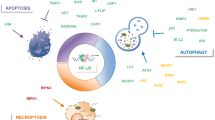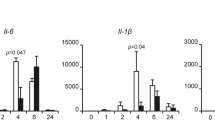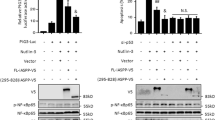Abstract
In addition to coordinating immune and inflammatory responses, NF-κB/Rel transcription factors control cell survival1. Normally, NF-κB dimers are sequestered in the cytoplasm by binding to inhibitory IκB proteins, and can be activated rapidly by signals that induce the sequential phosphorylation and proteolysis of IκBs1. Activation of NF-κB antagonizes apoptosis or programmed cell death by numerous triggers, including the ligand engagement of ‘death receptors’ such as tumour-necrosis factor (TNF) receptor2. The anti-apoptotic activity of NF-κB is also crucial to oncogenesis and to chemo- and radio-resistance in cancer2. Cytoprotection by NF-κB involves the activation of pro-survival genes2; however, its basis remains poorly understood. Here we report that NF-κB complexes downregulate the c-Jun amino-terminal kinase (JNK) cascade3, thus establishing a link between the NF-κB and the JNK pathways. This link involves the transcriptional upregulation of gadd45β/myd118 (ref. 4), which downregulates JNK signalling induced by the TNF receptor (TNF-R). This NF-κB-dependent inhibition of the JNK pathway is central to the control of cell death. Our findings define a protective mechanism that is mediated by NF-κB complexes and establish a role for the persistent activation of JNK in the apoptotic response to TNF-α.
This is a preview of subscription content, access via your institution
Access options
Subscribe to this journal
Receive 51 print issues and online access
$199.00 per year
only $3.90 per issue
Buy this article
- Purchase on Springer Link
- Instant access to full article PDF
Prices may be subject to local taxes which are calculated during checkout





Similar content being viewed by others
References
Ghosh, S., May, M. J. & Kopp, E. B. NF-κB and Rel proteins: evolutionarily conserved mediators of immune responses. Annu. Rev. Immunol. 16, 225–260 (1998).
Baldwin, A. S. Control of oncogenesis and cancer therapy resistance by the transcription factor NF- κB. J. Clin. Inves. 107, 241–246 (2001).
Davis, R. J. Signal transduction by the JNK group of MAP kinases. Cell 103, 239–252 (2000).
Vairapandi, M., Balliet, A. G., Fornace J. J. Jr, Hoffman, B. & Liebermann, D. A. The differentiation primary response gene MyD118, related to GADD45, encodes for a nuclear protein which interacts with PCNA and p21WAF1/CIP1. Oncogene 12, 2579–2594 (1996).
Vito, P., Lacana, E. & D'Adamio, L. Interfering with apoptosis: Ca2+-binding protein ALG-2 and Alzheimer's disease gene ALG-3. Science 271, 521–525 (1996).
Beg, A. A. & Baltimore, D. An essential role for NF-κB in preventing TNF-α-induced cell death. Science 274, 782–787 (1996).
Budihardjo, I., Oliver, H., Lutter, M., Luo, X. & Wang, X. Biochemical pathways of caspase activation during apoptosis. Annu. Rev. Cell Dev. Biol. 15, 269–290 (1999).
Takekawa, M. & Saito, H. A family of stress-inducible GADD45-like proteins mediate activation of the stress-responsive MTK1/MEKK4 MAPKKK. Cell. 95, 521–530 (1998).
Zhan, Q. et al. Association with Cdc2 and inhibition of Cdc2/Cyclin B1 kinase activity by the p53-regulated protein Gadd45. Oncogene 18, 2892–2900 (1999).
Van Antwerp, D. J., Martin, S. J., Kafri, T., Green, D. R. & Verma, I. M. Suppression of TNF-α-induced apoptosis by NF-κB. Science 274, 787–789 (1996).
Zhang, W. et al. CR6: A third member in the MyD118 and Gadd45 gene family which functions in negative growth control. Oncogene 18, 4899–4907 (1999).
Wang, C.-Y., Mayo, M. W., Korneluk, R. G., Goeddel, D. V. & Baldwin, A. S. Jr NF-κB antiapoptosis: Induction of TRAF1 and TRAF2 and c-IAP1 and c-IAP2 to suppress caspase-8 activation. Science 281, 1680–1683 (1998).
Zong, W. X., Edelstein, L. C., Chen, C., Bash, J. & Gelinas, C. The prosurvival Bcl-2 homolog Bfl-1/A1 is a direct transcriptional target of NF-κB that blocks TNF-α-induced apoptosis. Genes Dev. 13, 382–387 (1999).
Chen, C., Edelstein, L. C. & Gelinas, C. The Rel/NF-κB family directly activates expression of the apoptosis inhibitor Bcl-xL. Mol. Cell. Biol. 20, 2687–2695 (2000).
Schwenzer, R. et al. The human tumor necrosis factor (TNF-) receptor-associated factor 1 gene (TRAF1) is up-regulated by cytokines of the TNF-ligand family and modulates TNF-induced activation of NF-κB and c-Jun N-terminal kinase. J. Biol. Chem. 274, 19368–19374 (1999).
Chu, Z.-L. et al. Suppression of tumor necrosis factor-induced cell death by inhibitor of apoptosis c-IAP2 is under NF-κB control. Proc. Natl Acad. Sci. USA 94, 10057–10062 (1997).
Duriez, P. J., Wong, F., Dorovini-Zis, K., Shahidi, R. & Karsan, A. A1 functions at the mitochondria to delay endothelial apoptosis in response to tumor necrosis factor. J. Biol. Chem. 275, 18099–18107 (2000).
Zapata, J. M. et al. TNF-R-associated factor family protein expression in normal tissues and lymphoid malignancies. J. Immunol. 165, 5084–5096 (2000).
Arlt, A. et al. Expression of the NF-κB target gene IEX-1 (p22/PRG1) does not prevent cell death but instead triggers apoptosis in HeLa cells. Oncogene 20, 69–76 (2001).
Chang, L. & Karin, M. Mammalian MAP kinase signalling cascades. Nature 410, 37–40 (2001).
Tobiume, K. et al. ASK1 is required for sustained activations of JNK-p38 MAP kinases and apoptosis. EMBO Rep. 2, 222–228 (2001).
Guo, Y.-L., Baysal, K., Kang, B., Yang, L.-J. & Williamson, J. R. Correlation between sustained c-Jun N-terminal protein kinase activation and apoptosis induced by tumor necrosis factor-α in rat mesangial cells. J. Biol. Chem. 273, 4027–4034 (1997).
Lu, X., Nemoto, S. & Lin, A. Identification of c-Jun NH2-terminal protein kinase (JNK)-activating kinase 2 as an activator of JNK but not p38. J. Biol. Chem. 272, 24751–24754 (1997).
Huang, S. et al. Apoptosis signaling pathway in T cells is composed of ICE/Ced-3 family proteases and MAP kinase kinase 6. Immunity 6, 739–749 (1997).
Jacinto, E., Werlen, G. & Karin, M. Cooperation between Syk and Rac1 leads to synergistic JNK activation in T Lymphocytes. Immunity 8, 31–41 (1998).
Chen, Y. R. & Tan, T. H. The c-jun N-terminal kinase pathway and apoptotic signaling. Int. J. Oncol. 16, 651–662 (2000).
Shaulian, E. & Karin, M. Stress-induced JNK activation is independent of Gadd45 induction. J. Biol. Chem. 274, 29595–29598 (1999).
Wang, X., Gorospe, M. & Holbrook, N. J. Gadd45 is not required for activation of c-Jun N-terminal kinase or p38 during acute stress. J. Biol. Chem. 274, 29599–29602 (1999).
Lu, B. et al. Gadd45γ mediates the activation of the p38 and JNK pathways and cytokine production in effector TH1 cells. Immunity 14, 583–590 (2001).
Stegh, A. H. et al. Identification of the cytolinker plectin as a major early in vivo substrate for caspase 8 during CD95- and tumor necrosis factor receptor-mediated apoptosis. Mol. Cell. Biol. 15, 5665–5679 (2000).
Acknowledgements
We thank M. Peter, A. Ma, H. Singh, C.-R. Wang, P. Ashton-Rickardt, M. Rosner and C. G. Pham for comments on the manuscript. We are grateful to L. D'Adamio for advice on the manuscript and the ‘death trap’ system, and for pLTP. We thank D. Baltimore and A. Hoffmann for the RelA-/- MEFs; A. Lin for dominant-negative JNKK2; J. Han for MKK3b; D. Liebermenn and A. Balliet for Gadd45β reagents; and S. Rua for help with manuscript preparation. Supported in part by the Damon Runyon Scholar Award of the Cancer Research Fund and an NIH grant.
Author information
Authors and Affiliations
Corresponding author
Supplementary Information
Rights and permissions
About this article
Cite this article
De Smaele, E., Zazzeroni, F., Papa, S. et al. Induction of gadd45β by NF-κB downregulates pro-apoptotic JNK signalling. Nature 414, 308–313 (2001). https://doi.org/10.1038/35104560
Received:
Accepted:
Issue Date:
DOI: https://doi.org/10.1038/35104560
This article is cited by
-
Probiotics mixture reinforces barrier function to ameliorate necrotizing enterocolitis by regulating PXR-JNK pathway
Cell & Bioscience (2021)
-
Comprehensive high-throughput meta-analysis of differentially expressed microRNAs in transcriptomic datasets reveals significant disruption of MAPK/JNK signal transduction pathway in Adult T-cell leukemia/lymphoma
Infectious Agents and Cancer (2021)
-
IκBα is required for full transcriptional induction of some NFκB-regulated genes in response to TNF in MCF-7 cells
npj Systems Biology and Applications (2021)
-
Deletion of IKK2 in haematopoietic cells of adult mice leads to elevated interleukin-6, neutrophilia and fatal gastrointestinal inflammation
Cell Death & Disease (2021)
Comments
By submitting a comment you agree to abide by our Terms and Community Guidelines. If you find something abusive or that does not comply with our terms or guidelines please flag it as inappropriate.



